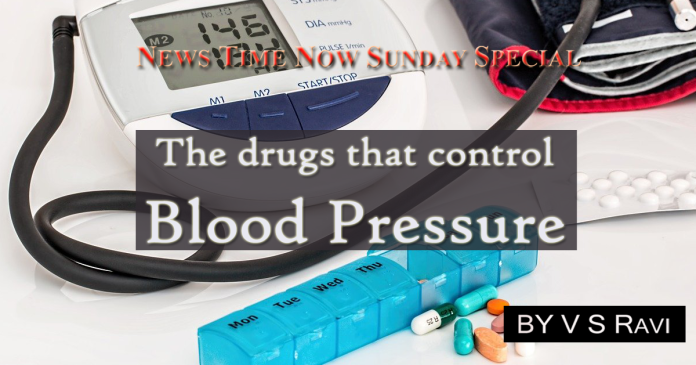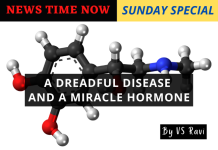” Where no sea runs
The waters of the heart push in their tides”- Dylan Thomas
‘Blood Pressure is the pressure of blood in the arteries and is a measure of the tension in the arterial wall produced by the blood forced from the heart. It depends on the output of the heart and the resistance to the flow provided by the smaller arteries and arterioles. Blood pressure can be measured by an instrument called the sphygmomanometer. There are several models available all over the world including some sophisticated electronic devices but the one commonly seen in India has an inflatable cloth cuff which is connected by a rubber tube to a glass column containing mercury. The level of mercury indicates the pressure (in millimetres of mercury) that is exerted by the cuff which is wrapped around the upper arm of a patient. A rubber bulb is squeezed to inflate the cuff so as to stop the blood flowing through the brachial artery (running along the length of the arm). By gradually releasing the air in the cuff and simultaneously listening through a stethoscope applied to the arm, the doctor can measure two sounds, the readings corresponding to which indicate the systolic and the diastolic. The systolic is produced when the heart contracts and is the highest pressure in the circulatory system. The diastolic is the pressure within the circulatory system between heart beats. It reveals how much the heart has to work to overcome resistance in the arteries. So when a doctor’s instrument registers a reading of say 130/80 (the ideal level at which most health conscious people try to keep their blood pressure) it means that the systolic is 130 and the diastolic is 80.
Recent hypertension guideline in America recommends a BP treatment threshold of DBP ≥ 90 or SBP ≥ 140 mm Hg with ultimate treatment targets being <130/80 mm Hg; amongst those < 65 years, the SBP target is 120–129 mm Hg while in those 65 and older, the target is 130–139 systolic. (SBP is acronym for systolic blood pressure while DBP is acronym for Diastolic Blood pressure.
All of us areaware that heart attacks, due to high blood pressure kill millions of people all over the world every year. Similarly several millions suffer from high blood pressure, which if untreated, leads to heart disease. No wonder the treatment of these ailments arouses intense interest not only among doctors but also in the pharmaceutical industry.
The production of drugs to treat persons suffering from high blood pressure in particular is naturally big business—mainly because in many cases patients have to continue to take such drugs for a lifetime.
Recently a controversy has arisen over the question of using newer drugs to control high blood pressure. The question is whether drugs which have been routinely used for the treatment of blood pressure for several decades should be replaced because of any new evidence about their adverse side-effects.
It would appear that doctors are generally not in favour of discarding the established drugs. However, one could argue in favour of the new drugs such as enzyme inhibitors, calcium channel- blocking drugs and alpha-blocking drugs as well as the old ones such as diuretics and beta-blockers. Diuretics, or water pills, help your kidneys to excrete extra salt and water.
This is how diuretics clear extra fluid out and bring down your blood pressure. Diuretics thus help when you have too much fluid collecting because of heart disease or Kidney disease or other medical problems.
The beta-blockers work by blocking the effects of naturally occurring stimulants such as norepinephrine or the ‘beta’ receptors of the heart and blood vessels. Since beta receptors can be found in many parts of the body, these drugs have been found to have profound effects on conditions other than heart disease. Beta-blockers lower blood pressure by reducing the amount of blood pumped by the heart with each stroke; they work by reducing the amount of blood circulating in the veins and arteries and by reducing the nerve-impulses in the muscles of the veins and arteries that keep pressure high. Beta -blockers also inhibit the enzyme renin produced by kidney. Renin is converted into another substance angiotensin, a potent elevator of blood pressure and an important ingredient in maintaining blood pressure.
Calcium or slow channel-blockers prevent calcium from moving into muscle cells. This results in a reduction in the rate at which muscle cells contract or flex. Since less muscle flexion translates into less work for the heart, the need for oxygen is also reduced thereby contributing to the treatment of angina.
Calcium-blockers are also used to treat arrhythmias, i.e. abnormal heart rhythms, and high blood pressure. They are being studied for their positive effects on blood clotting, asthma, migraine and gastro-intestinal spasms.
Enzyme inhibitors or angiotensin converting enzyme inhibitors, inhibit the conversion of the protein angiotensin I to angiotensin II a powerful vasoconstrictor and this is useful in treating severe hypertension. Angiotensin I is produced by renin.
Alpha blockers are also a type of blood pressure medication. They lower blood pressure by preventing a hormone called norepinephrine from tightening the muscles in the walls of smaller arteries and veins. As a result, the blood vessels remain open and relaxed. This improves blood flow and lowers blood pressure
One of the basic objections to the latest drugs is simply that they haven’t had time to establish a track record. Hence, an evaluation of their potency, efficacy and side-effects, if any, has not yet been made. On the other hand, it was thought that the problem with diuretics and beta-blocking drugs (old drugs) is that while they are effective in reducing high blood pressure which is one of the risk factors for heart disease, they tend at the same time to’ raise the level of cholesterol in the blood, which had been thought to be a proven cause of heart attacks . Cholesterol is a waxy substance found in your blood. Your body needs cholesterol to build healthy cells; until now high levels of cholesterol were thought to increase your risk of heart disease. The theory was that high cholesterol, you can develop fatty deposits in your blood vessels. Eventually, these deposits grow, making it difficult for enough blood to flow through your arteries. Sometimes, those deposits can break suddenly and form a clot that causes a heart attack or stroke. However recent findings in America suggest that high cholesterol levels do not cause harm to the heart, and the labels on all food products do not indicate cholesterol content now.
The major risk factors for a heart attack are high blood pressure and smoking . They are supplemented by a number of other risk factors such as physical inactivity, diabetes, an aggressive or dominating personality, and mental tension caused by stress situations. Treatment of high blood pressure takes away an immediate risk of heart or kidney failure but when we come to treating mildly and moderately elevated blood pressure, it would appear that the treatment is effective only at reducing the risk of‘ stroke’ and not as effective in reducing the risk of a heart attack. This is really a handicap because for middle-aged people with only mild to moderately elevated blood pressure their biggest problem is really increased risk of a heart attack. Some scientists believe that one of the reasons for the difference in the effects of this treatment may be that factors that generate a heart attack, i.e. that cause the thickening of the walls of the arteries, do their damage over quite a number of years and it takes a long time to reverse the process. Clinical trials which have been conducted so far have only looked at the effects of treating blood pressure for a short period of five or six years. It is quite likely that if these were extended for several years then we would start seeing an effect on heart attack. But at the moment we appear to be still groping in the dark in this respect.
When one is treating mildly raised high blood pressure, one has to appreciate that one is going to have to treat a lot of people for a long time to save just a few of them from developing vascular disease. Therefore, the main consideration we have to bear in mind is that the drugs we use are safe.
So when prescribing drugs to treat mild to moderately high blood pressure, it comes down to a judgement by doctors, taking into consideration all the factors mentioned above.


















































